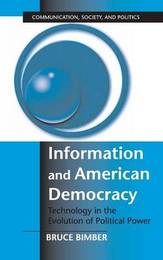
|
Information and American Democracy: Technology in the Evolution of Political Power
Hardback
Main Details
| Title |
Information and American Democracy: Technology in the Evolution of Political Power
|
| Authors and Contributors |
By (author) Bruce Bimber
|
| Series | Communication, Society and Politics |
|---|
| Physical Properties |
| Format:Hardback | | Pages:286 | | Dimensions(mm): Height 229,Width 152 |
|
| Category/Genre | Internet guides and online services |
|---|
| ISBN/Barcode |
9780521800679
|
| Classifications | Dewey:321.80973 |
|---|
| Audience | | Professional & Vocational | | Tertiary Education (US: College) | |
|---|
| Illustrations |
8 Tables, unspecified; 4 Line drawings, unspecified
|
|
Publishing Details |
| Publisher |
Cambridge University Press
|
| Imprint |
Cambridge University Press
|
| Publication Date |
24 February 2003 |
| Publication Country |
United Kingdom
|
Description
This book assesses the consequences of new information technologies for American democracy in a way that is theoretical and also historically grounded. The author argues that new technologies have produced the fourth in a series of 'information revolutions' in the US, stretching back to the founding. Each of these, he argues, led to important structural changes in politics. After re-interpreting historical American political development from the perspective of evolving characteristics of information and political communications, the author evaluates effects of the Internet and related new media. The analysis shows that the use of new technologies is contributing to 'post-bureaucratic' political organization and fundamental changes in the structure of political interests. The author's conclusions tie together scholarship on parties, interest groups, bureaucracy, collective action, and political behavior with new theory and evidence about politics in the information age.
Reviews'A fascinating and timely analysis ... this is a cutting edge book that should be read by all interested in the evolution of policy-making.' The Scientific and Medical Network 'Bruce Bimber's book is very much a product of the new, post-dotcom, sobriety, but rather than simply write a backlash work that rubbishes any idea of transformation, he has managed to combine insights from US media history, political communication, public administration and democratic theory to produce a genuinely novel interpretation of the role played by what he terms the 'information infrastructure' in bringing about political change ... a highly original and provocative interpretation of the past, present and likely future of American politics ... should inspire political scientists of all kinds.' Public Administration
|